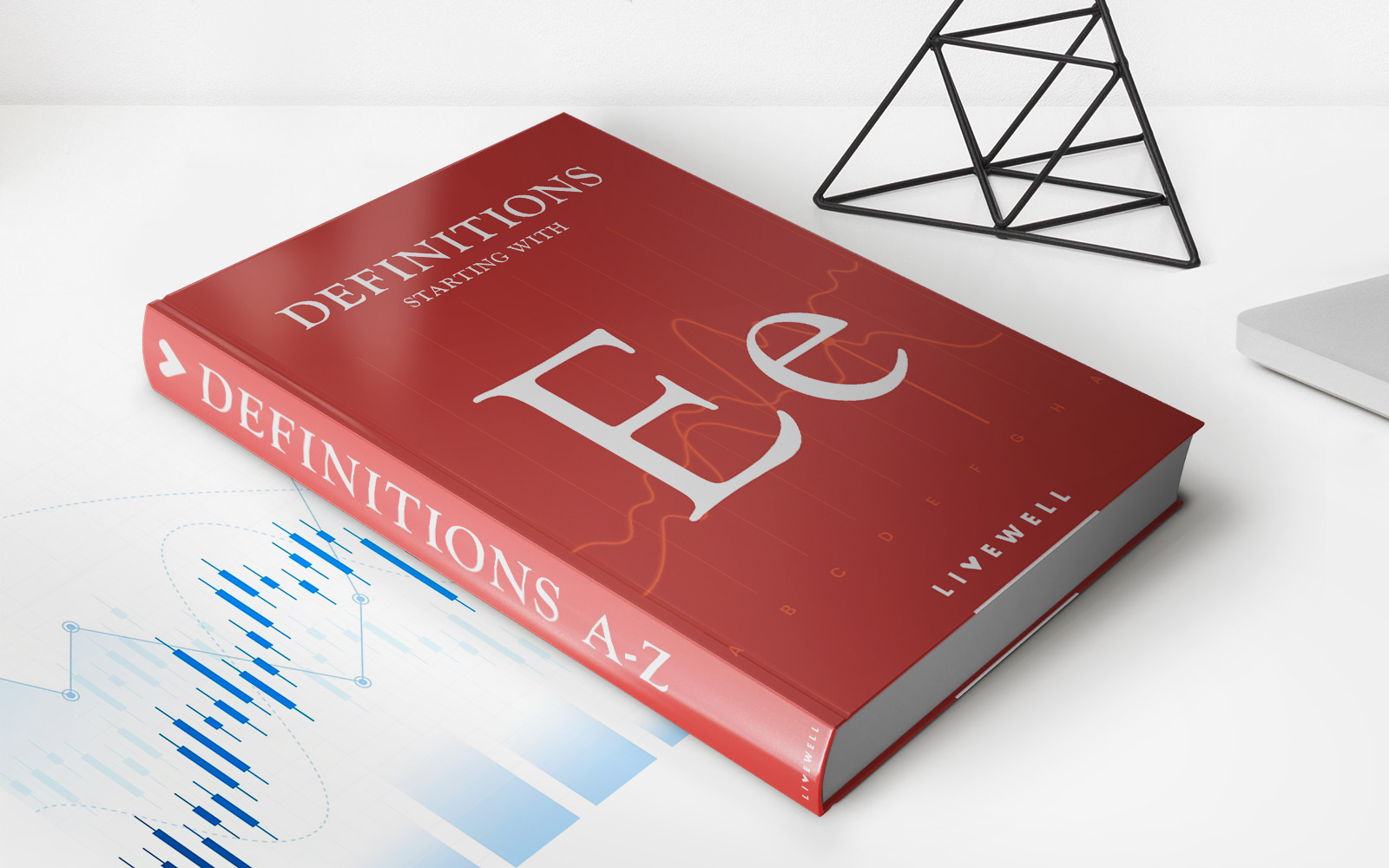Home>Finance>What Are The Best Certificates Of Deposit To Buy


Finance
What Are The Best Certificates Of Deposit To Buy
Modified: December 29, 2023
Discover the top certificates of deposit (CDs) in the finance industry. Find the best options to invest your money and maximize your returns.
(Many of the links in this article redirect to a specific reviewed product. Your purchase of these products through affiliate links helps to generate commission for LiveWell, at no extra cost. Learn more)
Table of Contents
Introduction
When it comes to securing your financial future, finding the right investment options is crucial. One such option that offers safety and stability is the Certificate of Deposit (CD). CDs are considered low-risk investments that provide a fixed interest rate over a fixed period of time. They are often issued by banks or credit unions, making them a popular choice among investors.
CDs offer a range of benefits, including guaranteed returns, a fixed interest rate, and FDIC (Federal Deposit Insurance Corporation) insurance coverage for accounts up to $250,000. As a result, they are an ideal choice for individuals looking to preserve their capital while earning a steady income.
However, not all CDs are created equal. With a wide array of options available, it can be challenging to determine which certificates of deposit are the best fit for your financial goals. Factors such as interest rates, terms, and additional features play a crucial role in making an informed decision.
In this article, we will explore the different types of certificates of deposit available in the market, and discuss the factors to consider when buying one. Whether you’re looking for higher yields, flexibility, or specific features, understanding the various options will help you make an informed investment decision.
Certificate of Deposit (CD) Basics
A Certificate of Deposit (CD) is a financial product offered by banks and credit unions that allows individuals to invest a fixed amount of money for a specific period of time, known as the term. In return, the investor receives a fixed interest rate, typically higher than a regular savings account. The interest is paid to the investor at regular intervals, either monthly, quarterly, semi-annually, or annually, depending on the terms of the CD.
CDs are known for their safety and stability, as they are insured by the FDIC up to $250,000 per account. This makes them a low-risk investment option, particularly suitable for conservative investors who prioritize capital preservation over high returns.
CD terms can vary from a few months to several years, with longer terms typically offering higher interest rates. While the investor can technically withdraw their funds before the CD matures, early withdrawal often leads to penalties, such as forfeiting a portion of the interest earned or even the principal itself.
There are two primary types of CDs: traditional CDs and high-yield CDs. Traditional CDs offer a fixed interest rate for the entire term, while high-yield CDs have variable rates that can change over time based on market conditions.
It’s important to note that the interest earned from CDs is considered taxable income and must be reported on your tax return each year. However, if your CD is held in a tax-advantaged account, such as an Individual Retirement Account (IRA), you can defer taxes until you withdraw the funds.
Overall, CDs provide a safe and reliable investment option for individuals looking to earn a fixed return on their savings. However, before deciding to invest in a CD, it’s essential to consider factors such as the term length, interest rate, and liquidity needs to ensure it aligns with your financial goals and risk tolerance.
Factors to Consider When Buying CDs
When purchasing a Certificate of Deposit (CD), it’s important to take several factors into consideration to ensure you choose the right option for your financial goals. Here are some key factors to keep in mind:
- Interest Rate: The interest rate is a crucial factor in determining the return on your CD investment. Higher interest rates generally provide a higher yield, but it’s important to compare rates offered by different financial institutions to find the most competitive option.
- Term Length: CD terms can range from a few months to several years. Shorter terms offer flexibility and quicker access to funds, while longer terms typically provide higher interest rates. Consider your financial goals and liquidity needs when selecting a term length for your CD.
- Early Withdrawal Penalties: It’s essential to be aware of the penalties associated with withdrawing funds from a CD before the maturity date. These penalties can vary depending on the financial institution and the CD terms. Evaluate your financial situation and potential future needs to choose a CD with reasonable withdrawal penalties.
- FDIC Insurance: Ensure that the financial institution offering the CD is FDIC insured. This provides protection for your investment, up to $250,000 per depositor, in the event that the institution fails.
- Minimum Deposit Requirement: Different CDs have different minimum deposit requirements. Consider your available funds and ensure that you can meet the minimum deposit requirement before purchasing a CD.
- Renewal Options: Some CDs offer automatic renewal at the end of the term, while others require manual renewal. Understand the renewal options and terms offered by the financial institution to ensure that it aligns with your investment strategy.
- Callable CDs: Callable CDs give the issuing bank the right to “call back” or terminate the CD before the maturity date. These CDs often offer higher interest rates but carry the risk of early redemption. Evaluate the pros and cons before investing in callable CDs.
Considering these factors will help you make an informed decision when buying a CD. It’s important to conduct thorough research, compare options from different financial institutions, and consult with a financial advisor if needed. By carefully assessing these factors, you can choose a CD that aligns with your financial goals and risk tolerance.
Top Certificates of Deposit to Consider
When it comes to choosing the best certificates of deposit (CDs), it’s essential to consider your financial goals, risk tolerance, and desired features. Here are eight types of CDs that you may want to consider:
- High-Yield CDs: These CDs offer higher interest rates compared to traditional CDs. They are ideal for investors looking to maximize their returns. However, be aware that these rates may include certain conditions, such as maintaining a higher minimum balance or longer terms.
- Traditional CDs: Traditional CDs offer a fixed interest rate for the entire term. They provide stability and are suitable for conservative investors who prioritize capital preservation.
- Jumbo CDs: Jumbo CDs are similar to traditional CDs but come with higher minimum deposit requirements, typically ranging from $100,000 to $1 million. In exchange for the larger investment, jumbo CDs often offer higher interest rates.
- Callable CDs: Callable CDs give the issuing bank the option to recall or terminate the CD before maturity. These CDs often offer higher interest rates but come with the risk of early redemption. Evaluate the terms and potential risks before investing in callable CDs.
- Brokered CDs: Brokered CDs are purchased through brokerage firms and offer a wide range of options from different banks. These CDs provide flexibility and allow you to access a larger pool of CD options in terms of interest rates and terms.
- Step-Up CDs: Step-Up CDs have an increasing interest rate structure. The interest rate on these CDs may rise at predetermined intervals, providing potential for higher returns over time.
- Liquid CDs: Liquid CDs offer more flexibility in terms of early withdrawal penalties. They allow you to withdraw a portion of the principal or earned interest without incurring substantial penalties.
- No-Penalty CDs: No-penalty CDs provide the option to withdraw funds before maturity without any penalties. These CDs offer more flexibility and can be a good choice if you anticipate needing access to your funds before the term ends.
When choosing a CD, consider your investment goals, risk tolerance, and liquidity needs. It’s crucial to compare rates, check the terms and conditions, and thoroughly research the financial institution offering the CD. Additionally, seek advice from a financial advisor to ensure that the selected CD aligns with your overall investment strategy.
High-Yield CDs
One of the top certificates of deposit (CDs) to consider is the High-Yield CD. As the name suggests, these CDs offer higher interest rates compared to traditional CDs, making them an attractive option for investors looking to maximize their returns.
High-Yield CDs are typically offered by online banks, credit unions, or other financial institutions looking to attract customers with competitive rates. The higher interest rates are often a result of these institutions having lower overhead costs compared to brick-and-mortar banks, allowing them to pass on the savings to customers in the form of higher yields.
However, it’s important to note that higher interest rates on High-Yield CDs may come with certain conditions. For example, you may be required to maintain a higher minimum balance or commit to a longer term to earn the advertised rate. Be sure to carefully review the terms and conditions before investing in a High-Yield CD to ensure that you meet the requirements and understand any potential limitations.
One advantage of High-Yield CDs is that they provide a predictable and guaranteed return on your investment. The interest rate is fixed for the duration of the CD term, providing stability and security. This makes them an appealing choice for risk-averse investors who prioritize capital preservation.
When considering High-Yield CDs, it’s essential to compare rates offered by different financial institutions. While the rates may vary, it’s also important to consider the reputation and stability of the institution. Look for FDIC insurance, which provides protection for your investment up to $250,000 per depositor, in case of a bank failure.
Investing in High-Yield CDs requires a careful assessment of your financial goals and risk tolerance. Consider factors such as the term length, minimum deposit requirement, and any potential withdrawal penalties. Additionally, keep in mind that interest earned from CDs is taxable income. Consult with a financial advisor to ensure that High-Yield CDs align with your overall investment strategy and can help you achieve your financial goals.
Traditional CDs
Traditional CDs are one of the most popular and straightforward types of certificates of deposit (CDs). These CDs offer a fixed interest rate for the entire term, making them an ideal choice for conservative investors who prioritize capital preservation and stability.
One of the key advantages of traditional CDs is the predictability of returns. The interest rate is locked in for the duration of the CD term, providing a guaranteed rate of return on your investment. This stability can be particularly appealing for individuals who prefer a low-risk investment option.
Traditional CDs are typically offered by banks and credit unions, making them easily accessible to individuals. They often come with various term lengths, ranging from a few months to several years. Generally, longer-term CDs offer higher interest rates, allowing you to maximize your returns over an extended period.
It’s important to consider the minimum deposit requirement for traditional CDs, as banks may have different thresholds. Some banks may allow you to open a CD with a small initial deposit, while others may require a more substantial amount. Evaluate your available funds and ensure that you can meet the minimum requirement before purchasing a traditional CD.
While traditional CDs offer stability and guaranteed returns, they do come with some potential drawbacks. One important consideration is the lack of liquidity during the CD term. Withdrawing funds before the CD matures may result in early withdrawal penalties, which can eat into your earnings. Be sure to assess your cash flow needs and choose a CD term that aligns with your financial goals.
It’s common for individuals to ladder their traditional CDs by investing in multiple CDs with different maturity dates. This strategy allows investors to have regular access to funds as each CD matures, while still benefiting from the higher interest rates associated with longer-term CDs.
When considering traditional CDs, it’s important to compare rates offered by different institutions and evaluate their financial stability. Look for institutions that are FDIC insured, providing protection for your investment up to $250,000 per depositor, in case of a bank failure.
Traditional CDs provide a safe and reliable investment option for individuals seeking stability and relatively low-risk returns. However, it’s important to carefully assess your financial goals, liquidity needs, and the accuracy of the chosen term before making a decision. Consulting with a financial advisor can provide valuable insights and guidance to help you make an informed investment choice.
Jumbo CDs
Jumbo CDs are a type of certificate of deposit (CD) that require a higher minimum deposit compared to traditional CDs. Typically, jumbo CDs have minimum deposit requirements ranging from $100,000 to $1 million. These CDs are designed for individuals with substantial funds to invest and are looking to earn potentially higher interest rates.
The higher minimum deposit requirement of jumbo CDs often results in increased interest rates. Banks offer these higher rates to incentivize customers with larger deposits. This allows investors to potentially earn greater returns while still enjoying the same benefits of traditional CDs, such as FDIC insurance.
One advantage of jumbo CDs is that they provide a safe and secure investment option for individuals with significant savings. Similar to traditional CDs, jumbo CDs offer a fixed interest rate for a specified term, ensuring a predictable and guaranteed return on your investment. As such, they are particularly attractive to risk-averse investors who prioritize capital preservation.
It’s important to consider the term length of jumbo CDs when making an investment decision. Generally, longer-term jumbo CDs offer higher interest rates compared to shorter-term options. Carefully assess your financial goals and liquidity needs to choose a term length that aligns with your investment strategy.
While jumbo CDs offer the potential for higher returns, they also come with some potential drawbacks. The larger minimum deposit requirement may make them less accessible for some investors. Additionally, jumbo CDs are less liquid compared to regular savings accounts, as withdrawing funds before the maturity date typically results in penalties.
When considering jumbo CDs, it’s essential to research and compare rates offered by different financial institutions. Look for reputable banks that offer competitive rates and provide FDIC insurance coverage for your investment. Evaluating the financial stability and customer reviews of the issuing institutions can help ensure the safety of your investment.
Jumbo CDs can be an attractive option for individuals with substantial savings that are looking for a secure and potentially higher-yielding investment. However, it’s important to carefully evaluate your financial goals, risk tolerance, and accessibility needs before committing to a jumbo CD. Consulting with a financial advisor can provide valuable guidance to help you make the best investment decision based on your unique circumstances.
Callable CDs
Callable CDs are a unique type of certificate of deposit (CD) that offers higher interest rates in exchange for increased risk. Unlike traditional CDs, callable CDs provide the issuing bank with the option to “call back” or terminate the CD before its maturity date.
The higher interest rates associated with callable CDs are attractive to investors seeking potentially better returns. However, this advantage comes with the risk of early redemption, meaning the bank can choose to close the CD before it reaches its full term. In such cases, investors may be forced to reinvest their funds at potentially lower interest rates.
The ability of the issuing bank to call back a CD provides them with flexibility in adjusting their liabilities according to prevailing market conditions. If interest rates decline after the CD is issued, the bank may choose to call back the CD and reissue a new CD at a lower interest rate. This may be financially disadvantageous for the investor.
Callable CDs typically have a call schedule that specifies the conditions under which the bank can exercise its right to call back the CD. This includes the timeframe during which the call option is active and any applicable call premiums or penalties.
Investors considering callable CDs should carefully evaluate the terms and conditions associated with the call feature. It’s important to assess the potential risks and rewards, as well as to understand the bank’s call policy. Taking into account your financial objectives and risk tolerance, you can decide whether the potential for higher returns justifies the possibility of early redemption.
Before investing in callable CDs, it’s crucial to compare rates offered by different financial institutions. Consider the reputation and stability of the issuing banks, as well as their track record with callable CDs. As with any investment, it’s important to assess the potential risks and rewards, and consult with a financial advisor if needed.
Callable CDs are not suitable for all investors. If you value stability and the ability to maintain your investment for the full term, traditional CDs may be a better choice. However, if you are comfortable with the increased risk and potential for higher returns, callable CDs can be an option to consider.
Brokered CDs
Brokered CDs are a type of certificate of deposit (CD) that are purchased through brokerage firms instead of directly from banks or credit unions. These CDs offer investors a wider range of options from different banks, allowing them to access a larger pool of CD choices in terms of interest rates and terms.
The brokerage firm acts as an intermediary, connecting investors with CDs from various financial institutions. This provides investors with the opportunity to compare rates and terms from different banks, potentially securing a more competitive yield on their investment.
One advantage of brokered CDs is the flexibility they offer in terms of investment amount. While traditional CDs may come with specific minimum deposit requirements set by the issuing institutions, brokered CDs allow investors to invest smaller or larger amounts depending on their preferences and available funds.
Brokered CDs also provide liquidity to investors. Unlike traditional CDs, which typically have strict early withdrawal penalties, brokered CDs can be bought or sold in the secondary market before maturity. This allows investors to potentially exit their investment if needed, although it’s important to note that market conditions and liquidity may impact the ease and cost of selling a brokered CD.
When considering brokered CDs, it’s important to understand the potential risks. The issuing bank’s financial stability, the terms of the CD, and any potential call options or penalties should be carefully evaluated. It’s also advisable to work with reputable brokerage firms and ensure that they are properly registered and regulated.
Investors should also be aware that brokered CDs may come with additional fees or commissions. The brokerage firm may charge a transaction fee or other costs for their services. It’s important to consider these fees and factor them into the overall return on investment.
Before investing in brokered CDs, it’s essential to conduct thorough research and compare rates and terms from different financial institutions and brokerage firms. Carefully read the prospectus and terms and conditions associated with the CD to fully understand the features and risks. Consulting with a financial advisor can provide valuable guidance in navigating the complexities of brokered CD investments.
Brokered CDs can be a viable option for investors looking for a wider range of CD choices and the potential for enhanced liquidity. However, it’s crucial to carefully consider the risks and costs associated with brokered CDs and ensure they align with your investment goals and risk tolerance.
Step-Up CDs
Step-Up CDs are a type of certificate of deposit (CD) that offer an increasing interest rate structure over the term of the CD. These CDs provide the potential for higher returns as the interest rate “steps up” at specific intervals during the CD’s duration.
The step-up feature of these CDs makes them appealing to investors who want to take advantage of potentially rising interest rates. With Step-Up CDs, you lock in an initial interest rate, which may be lower than the prevailing market rates at the time of purchase. However, as the CD progresses, the interest rate increases at predetermined intervals.
The intervals at which the interest rate steps up can vary, ranging from annual to every few years. The specific terms of the Step-Up CD will outline the exact timing and percentage increase of each step-up. As a result, investors can benefit from higher yield as interest rates rise without having to renegotiate a new CD.
Step-Up CDs provide a level of flexibility and adaptability to changing market conditions. If interest rates are expected to increase over the CD’s term, these CDs can be an advantageous choice. However, it’s important to note that if interest rates remain stagnant or decrease, the initial interest rate of the Step-Up CD may be lower than what a fixed-rate CD would offer.
When considering Step-Up CDs, it’s essential to carefully review the terms and conditions offered by different financial institutions. Factors to consider include the length of the CD, the interval and percentage of the step-ups, and any early withdrawal penalties.
Step-Up CDs are suitable for investors who seek potential higher returns over time and are willing to accept the initial lower interest rate. They are especially beneficial for individuals who believe interest rates will rise or experience a trend of increasing rates.
As with any investment, it’s crucial to evaluate your financial goals, risk tolerance, and market outlook before investing in Step-Up CDs. Conduct thorough research, compare rates from different institutions, and consult with a financial advisor to ensure they align with your overall investment strategy.
Liquid CDs
Liquid CDs, also known as no-penalty CDs, are a type of certificate of deposit (CD) that offer more flexibility in terms of early withdrawals. Unlike traditional CDs, which impose penalties for withdrawing funds before the maturity date, liquid CDs allow you to access a portion of your funds without incurring substantial penalties.
The specific terms and conditions of liquid CDs vary among different financial institutions. Some may allow you to withdraw a certain percentage of the principal or earned interest penalty-free, while others may offer complete liquidity with no penalties at all. This flexibility makes liquid CDs an appealing option for individuals who may anticipate the need for emergency funds or unforeseen expenses.
Investing in liquid CDs provides a balance between earning a fixed interest rate and maintaining accessibility to your funds. While traditional CDs typically offer higher interest rates than liquid CDs, the ability to withdraw funds without incurring significant penalties can be a valuable feature for those who value liquidity.
It’s important to note that the interest rates on liquid CDs may be slightly lower compared to traditional CDs with longer terms and stricter withdrawal policies. This reduction in interest rate serves as a trade-off for the added liquidity benefit.
When considering liquid CDs, it’s crucial to thoroughly review the terms and conditions offered by different financial institutions. Pay close attention to the penalties, withdrawal limits, and any other terms associated with early withdrawals. Additionally, consider the minimum deposit requirements and the interest rates offered to ensure they align with your financial goals.
While liquid CDs offer greater flexibility, it’s important to carefully evaluate your financial situation and liquidity needs. Consider your cash flow requirements, emergency fund needs, and potential investment opportunities before committing to a liquid CD. It’s also advisable to compare rates from different institutions and consult with a financial advisor to ensure that a liquid CD is the right fit for your investment strategy.
Investing in liquid CDs can provide a suitable balance between earning a competitive interest rate and maintaining accessibility to your funds. If you value liquidity and have a need for short-term or emergency funds, liquid CDs can be a valuable addition to your investment portfolio.
No-Penalty CDs
No-penalty CDs, as the name suggests, are a type of certificate of deposit (CD) that allows you to withdraw funds before the maturity date without incurring any penalties. These CDs offer the ultimate flexibility for investors who may anticipate the need for access to their funds in the near future.
No-penalty CDs typically have terms ranging from a few months to a few years, similar to traditional CDs. However, they come with the added advantage of providing liquidity without the risk of incurring early withdrawal penalties. This makes them an attractive option for individuals who want to protect their principal while maintaining the flexibility to withdraw funds if necessary.
With no-penalty CDs, you have the peace of mind knowing that you can access your funds without any financial repercussions. This feature can be especially useful in uncertain economic times or when unexpected expenses arise. However, it’s important to note that the interest rates on no-penalty CDs may be slightly lower compared to traditional CDs to compensate for the added flexibility.
When considering no-penalty CDs, it’s important to review and compare rates and terms offered by different financial institutions. Factors to consider include the minimum deposit requirement, the length of the CD term, and any potential limitations on withdrawals.
One potential drawback of no-penalty CDs is that the interest rates may not be as competitive as traditional CDs or other types of CDs. However, this trade-off allows you to have the peace of mind and flexibility of accessing your funds without any penalties.
If you anticipate needing access to your funds in the near future or want to have a portion of your savings readily available, a no-penalty CD can be a suitable option. It’s important to assess your financial goals, liquidity needs, and risk tolerance when choosing between different CD options.
As with any investment, it’s advisable to conduct research, compare rates, and carefully read the terms and conditions of the no-penalty CD before making a decision. Consulting with a financial advisor can also provide valuable insights and help you determine if a no-penalty CD aligns with your overall investment strategy.
No-penalty CDs offer a unique combination of stability, accessibility, and flexibility, making them a popular choice for investors who want to protect their principal while maintaining the option to access their funds without any penalties.
Conclusion
Certificates of Deposit (CDs) are a valuable investment tool for individuals seeking safety, stability, and potential returns. Throughout this article, we’ve explored various types of CDs and the factors to consider when buying them.
High-Yield CDs are beneficial for investors looking to maximize their returns by offering higher interest rates. Traditional CDs provide stability and fixed interest rates for the entire term, making them suitable for risk-averse individuals. Jumbo CDs, on the other hand, require larger deposits but often offer higher interest rates as a result.
Callable CDs come with the potential for higher interest rates but carry the risk of early redemption. Brokered CDs offer flexibility by providing access to a variety of CD options from different financial institutions. Step-Up CDs can be advantageous when interest rates are expected to rise over time.
Liquid CDs allow for more accessibility with the ability to make penalty-free withdrawals. No-penalty CDs offer complete flexibility as they allow for withdrawals without incurring any penalties.
When choosing a CD, it’s important to consider factors such as interest rates, term length, minimum deposit requirements, and potential penalties. Evaluating your financial goals, risk tolerance, and liquidity needs will help you make an informed decision and select the right CD for your circumstances.
Remember to compare rates and terms from different financial institutions, ensuring they have the necessary stability and FDIC insurance coverage. Additionally, consulting with a financial advisor can provide valuable guidance and help align your CD investments with your broader financial strategy.
Certificates of Deposit can play a vital role in diversifying your investment portfolio, preserving capital, and generating consistent income. Whether you choose a high-yield CD, traditional CD, or any other type, consider your financial goals and risk tolerance to make a sound investment decision.
In conclusion, by understanding the different types of CDs available and carefully analyzing your financial objectives, you can make informed choices to optimize your investment returns while safeguarding your assets.














